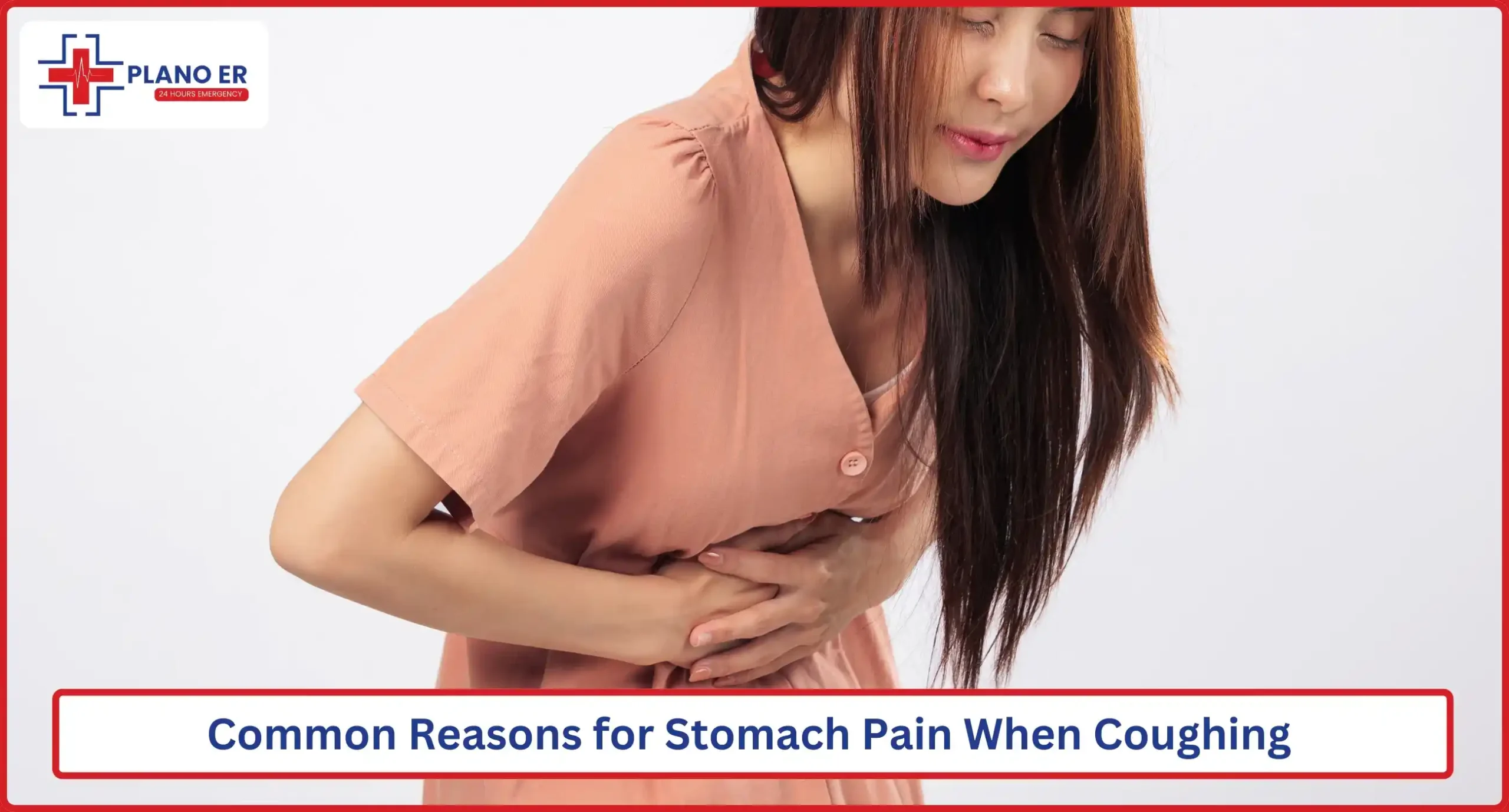Coughing is a natural reflex to clear your airways, but if you feel sharp or nagging pain in your stomach when you cough, it could point to more than just muscle strain. Whether it is a mild ache or severe discomfort, stomach pain triggered by coughing, sneezing, laughing, or moving may indicate underlying issues.
This guide answers why does my stomach hurt when I cough, covering causes like appendicitis, hernias, or muscle strain, and addresses queries such as why does my lower stomach hurt when I cough or why does my side hurt when I cough. For Plano residents, persistent or severe pain warrants a visit to the ER of Plano for emergency care to diagnose the cause quickly.
Why Does My Stomach Hurt When I Cough?

Coughing puts pressure on your abdominal muscles, which can cause or worsen pain if there is an underlying problem. The discomfort may range from a dull ache to sharp, severe pain, often intensified by actions like sneezing, laughing, or moving.
While temporary muscle strain is common, ongoing pain, especially with other symptoms, may suggest conditions like hernias, gallstones, or infections. The pain’s location, upper, lower, left, or right abdomen, helps identify causes, but professional evaluation via diagnostic imaging is essential for accurate diagnosis.
Can Severe Coughing Cause Abdominal Pain?
Yes, forceful or frequent coughing can strain abdominal muscles, leading to soreness that worsens when you cough, sneeze, or laugh. This is often temporary and improves with rest. However, if pain is sharp, localized, or persistent, it may stem from conditions like appendicitis or ovarian cysts, especially if coughing aggravates it.
Where Does It Hurt?
Noting the pain’s location is key:
- Upper stomach: May suggest gallstones, pancreatitis, or muscle strain.
- Lower stomach: Could indicate appendicitis, cystitis, or ovarian cysts.
- Right side: Often linked to appendicitis or gallstones.
- Left side: May relate to diverticular disease or kidney stones.
- Generalized pain: Could be muscle strain, hernias, or endometriosis. Localized pain, especially if severe when coughing, requires urgent evaluation.
Common Reasons for Stomach Pain When Coughing

Below are common causes, with symptoms and why coughing worsens pain, drawn from medical insights and competitor analyses.
Overuse and Strain of Stomach Muscles
Intense coughing, even from a cold, can overwork abdominal muscles, causing soreness or tenderness. This is common after prolonged coughing and may worsen with laughing, sneezing, or exercise. Symptoms include:
- Mild to moderate pain during movement.
- Tenderness when pressing the abdomen. Rest, hydration, and avoiding strain typically resolve this within days. If pain persists, seek abdominal pain care to rule out other causes.
Appendicitis
Appendicitis, an inflamed appendix, causes severe pain starting near the navel and shifting to the lower right abdomen. Coughing worsens this pain by pressing on the inflamed area. Appendicitis is a medical emergency requiring appendicitis care and rapid diagnostics like CT scans. Untreated, it can lead to rupture. Symptoms include:
- Abdominal swelling or bloating.
- Fever, nausea, or vomiting.
- Constipation or diarrhea.
- Decreased appetite.
Gallstones
Gallstones, hardened deposits in the gallbladder, cause sharp upper right or central abdominal pain, often lasting over 30 minutes. Coughing aggravates pain by jarring the gallbladder. Symptoms:
- Bloating, fever, or chills.
- Pain in the upper back or right shoulder.
- Jaundice, nausea, or vomiting.
- Indigestion after fatty foods. Treatment includes medication or surgery. Persistent fever or jaundice signals an emergency.
Kidney Stones
Kidney stones, hard mineral deposits, cause severe pain in the abdomen or back when passing through the urinary tract. Coughing increases pressure, worsening discomfort. Symptoms:
- Severe back or side pain.
- Bloody, cloudy, or foul-smelling urine.
- Fever, chills, nausea, or vomiting. Small stones may pass with water and rest, larger ones need surgery. If urination is blocked, seek onsite testing.
Diverticular Disease
Diverticular disease involves small sacs in the colon that, when inflamed, cause abdominal pain, often on the left side. Coughing worsens this by straining the colon. Symptoms:
- Bloating, nausea, or vomiting.
- Fever, chills, or bowel changes (constipation/diarrhea).
- Rarely, blood in stool (emergency). Treatment includes high-fiber diets or medications. Blood in stool requires immediate care.
Cystitis
Cystitis, a urinary tract infection, causes lower abdominal pain that worsens with coughing due to bladder irritation. More common in women, symptoms include:
- Frequent, painful urination.
- Cloudy, dark, or bloody urine.
- General unwellness. Mild cases resolve in days, but worsening symptoms need antibiotics and infection treatment.
Pancreatitis
Pancreatitis, inflammation of the pancreas, causes severe abdominal pain spreading to the back, worsened by coughing or pressure. Symptoms:
- Worsening pain over time.
- Abdominal swelling, loose stools.
- Unintentional weight loss.
- Fever, jaundice, or rapid heart rate (severe cases). Severe pancreatitis is life-threatening, requiring emergency services.
Endometriosis
Endometriosis, where uterine-like tissue grows outside the uterus, causes pelvic and lower abdominal pain, intensified by coughing. Symptoms:
- Pain during periods, sex, urination, or bowel movements.
- Digestive issues or bleeding between periods. Treatments include hormone therapy or surgery. Infertility is a risk, but it is not an emergency unless pain is severe.
Hernia
Hernias occur when an organ, typically the bowel, pushes through a muscle gap, causing a bulge in the belly or groin. Coughing worsens pain by increasing pressure. Symptoms:
- Pain when coughing, sneezing, or lifting.
- Bulge that worsens with strain.
- Severe pain, fever, or inability to pass stool (emergency). Surgery is often needed, especially if the bowel is trapped.
Ovarian Cysts
Ovarian cysts, fluid-filled sacs in the ovaries, may cause lower abdominal pain or bloating, aggravated by coughing. Most resolve naturally, but problematic cysts show:
- Sharp side pain or swelling.
- Heavy bleeding, fever, or dizziness (ruptured cyst, emergency). Mild cysts may need medication, surgery is rare but used for large or cancerous cysts.
Weak Pelvic Muscles
Weak pelvic floor muscles, common in women, cause lower abdominal pain and urinary incontinence, worsened by coughing, sneezing, or laughing. Symptoms:
- Pain or pressure in the pelvis.
- Leakage during activity. Pelvic floor exercises or physical therapy help, severe cases may need surgery.
Why Does My Stomach Hurt When I Cough While Pregnant?

Pregnancy strains abdominal muscles, and coughing can worsen this, causing pain. Conditions like round ligament pain or, rarely, placental issues may contribute. If pain is severe or accompanied by bleeding, seek pregnancy care immediately.
Why Does My Stomach Hurt When I Cough After Working Out?
Post-workout coughing may strain fatigued abdominal muscles, causing soreness. Overexertion or improper form can worsen this. Persistent pain may indicate a hernia or other issues needing evaluation.
How to Stop Stomach Pain When Coughing
For muscle strain, rest, hydration, and avoiding forceful coughing help. For underlying conditions, professional diagnosis is essential. Avoid self-diagnosis, treatments vary, such as antibiotics for cystitis or surgery for hernias. Temporary relief includes:
- Applying gentle heat to sore muscles.
- Avoiding heavy lifting or strenuous activity.
- Managing cough with hydration or lozenges (consult a provider). Persistent or severe pain requires specialized treatment to address the root cause.
When to Seek Emergency Care
Mild stomach pain from coughing often resolves with rest, but severe or persistent pain with these symptoms requires immediate attention:
- Fever, chills, or jaundice.
- Severe pain not relieved by rest.
- Nausea, vomiting, or inability to pass stool/urine.
- Blood in urine or stool.
- Rapid heart rate, dizziness, or heavy bleeding.
Frequently Asked Questions
Why Does My Lower Stomach Hurt When I Cough?
Lower pain may stem from cystitis, ovarian cysts, appendicitis, or hernias. Coughing increases pressure, worsening discomfort. Seek diagnostic imaging for an accurate diagnosis.
Why Does My Upper Stomach Hurt When I Cough?
Upper pain may indicate gallstones, pancreatitis, or muscle strain. A professional evaluation is needed if severe or persistent.
Why Does My Side Hurt When I Cough?
Right-side pain may suggest appendicitis or gallstones, left-side pain could be diverticular disease or kidney stones. Coughing aggravates these areas.
Should I Be Worried If My Stomach Hurts When I Cough?
Mild pain may be muscle strain, but severe, localized, or symptom-accompanied pain (fever, nausea) requires urgent care at facilities like the ER of Plano.
Why Does My Stomach Hurt When I Cough, Sneeze, or Laugh?
These actions increase abdominal pressure, strain muscles, or aggravate conditions like hernias or cysts. Persistent pain needs medical assessment.
Why Does My Stomach Hurt When I Cough Hard?
Hard coughing intensifies muscle strain or pressure on inflamed organs, such as in appendicitis or pancreatitis. Severe pain warrants immediate evaluation.
Conclusion
In conclusion, stomach pain when coughing can range from simple muscle strain to serious conditions like appendicitis or hernias. For Plano residents, the ER of Plano provides 24/7 emergency services with on-site testing to diagnose and treat causes swiftly. Do not ignore severe or persistent pain and contact us today for compassionate, expert care.






